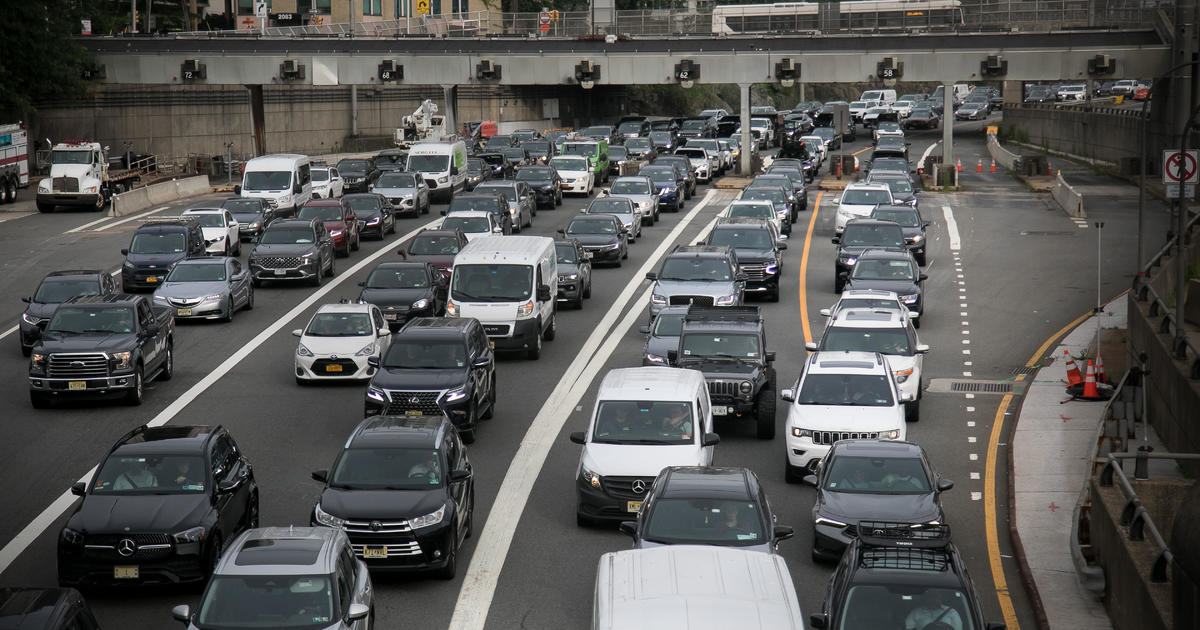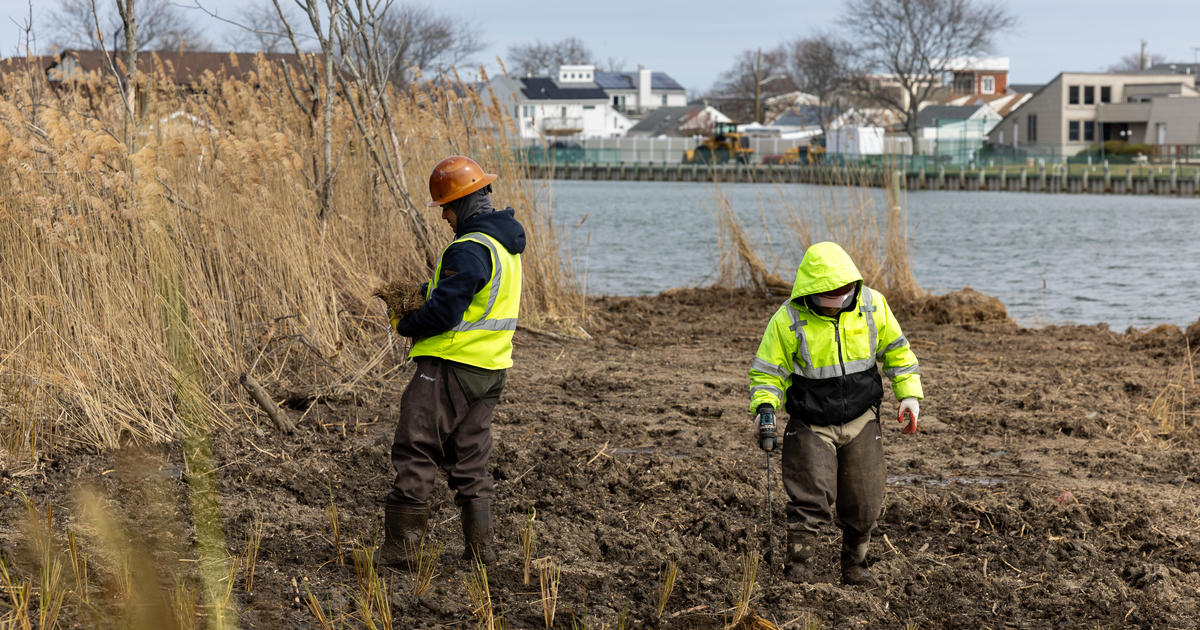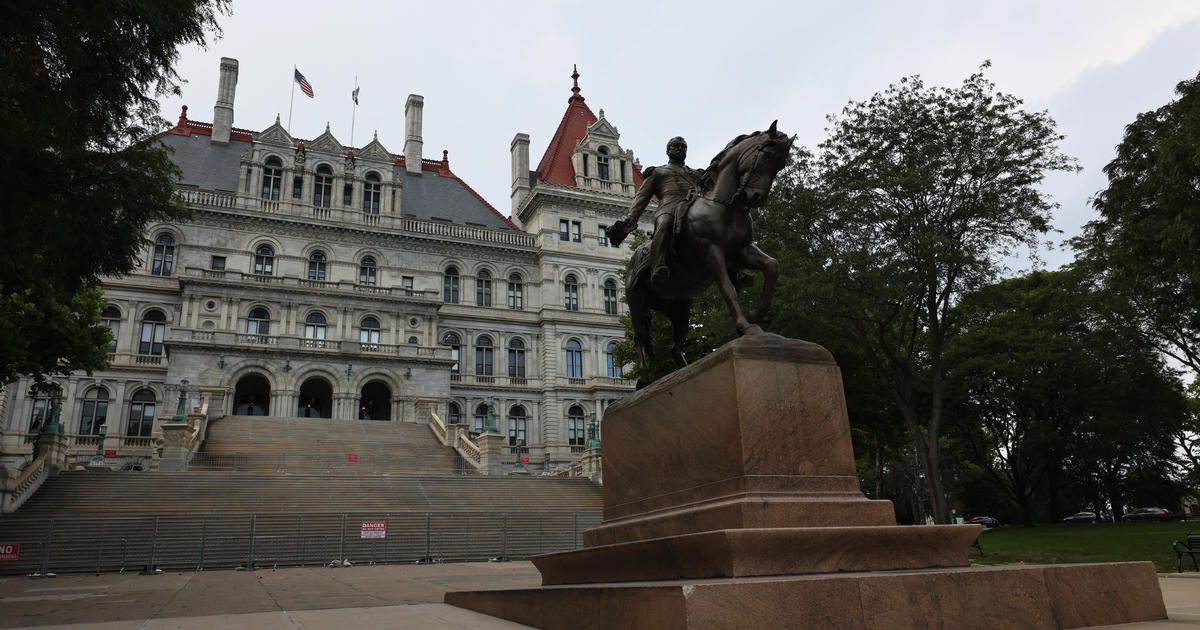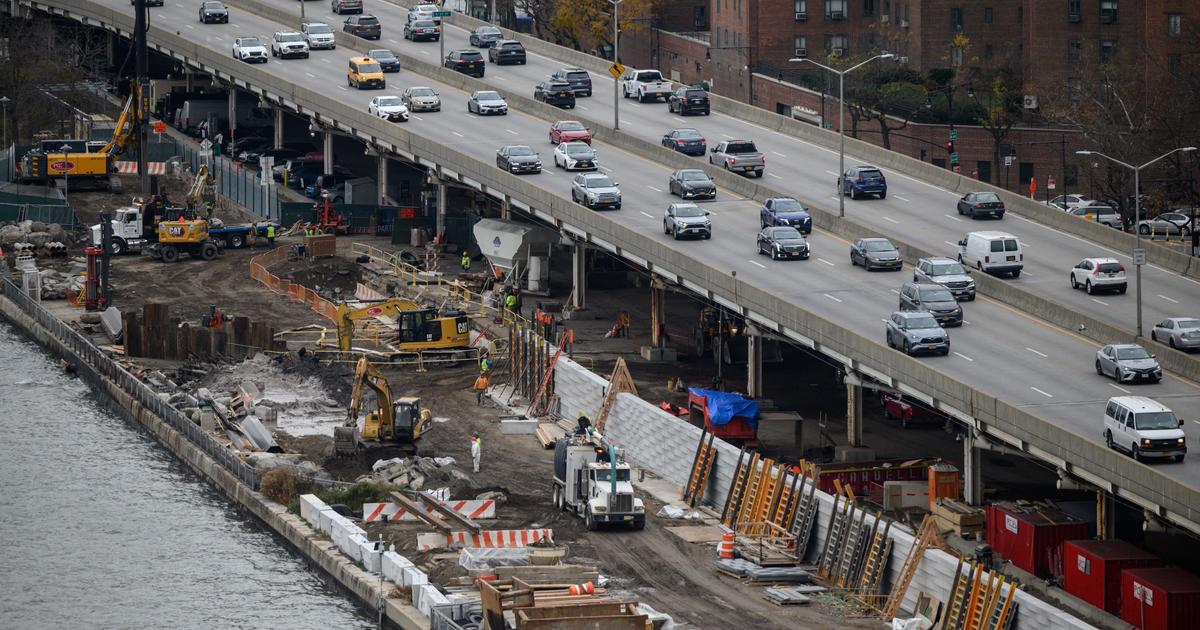Obama Focuses On Future, Calls For Cooperation In Final State Of The Union Address
WASHINGTON (CBSNewYork/AP) -- President Barack Obama directed his attention toward the future – beyond the next year and the end of his term in office – as he delivered his final State of the Union address on Tuesday.
"For my final address to this chamber, I don't want to talk just about the next year," Obama said. "I want to focus on the next five years, ten years, and beyond. I want to focus on our future."
Obama focused on the economy, the need for innovation in the face of rapid-paced change, and the need to protect the nation in the most effective way possible -- but he said most importantly, lawmakers and Americans as a whole most move away from political rancor and toward cooperation.
Watch: The State Of The Union Address | The Republican Rebuttal
He also seemed to take aim at Republican presidential candidates' claims -- particularly those of Donald Trump -- without naming names, CBS News' Norah O'Donnell noted.
Obama began by noting that the world is in a stage of rapid change -- both constructive and destructive. But he also noted that America has been through big changes many times throughout history, and took a swipe at those who responded by encouraging fear.
Full Text: 2016 State Of The Union Address
"Each time, there have been those who told us to fear the future; who claimed we could slam the brakes on change, promising to restore past glory if we just got some group or idea that was threatening America under control. And each time, we overcame those fears. We did not, in the words of Lincoln, adhere to the 'dogmas of the quiet past.' Instead we thought anew, and acted anew. We made change work for us, always extending America's promise outward, to the next frontier, to more and more people," Obama said. "And because we did – because we saw opportunity where others saw only peril – we emerged stronger and better than before."
Obama said America retains that spirit of resilience. But he warned that toxicity could undermine it all.
"Such progress is not inevitable. It is the result of choices we make together. And we face such choices right now," Obama warned. "Will we respond to the changes of our time with fear, turning inward as a nation, and turning against each other as a people? Or will we face the future with confidence in who we are, what we stand for, and the incredible things we can do together?"
Photos: 2016 State Of The Union Address
Obama focused on what he said were four major questions that the country would have to answer over the long-term future. The first dealt with the economy, and how the country could give everyone "a fair shot at opportunity and security."
Obama presented the economy in recent years as a success story. He said the nation is "right now has the strongest, most durable economy in the world," with booming job creation in the private sector and the unemployment rate cut in half – all while the deficit has been cut.
"Anyone claiming that America's economy is in decline is peddling fiction," Obama said.
But he conceded that the economic picture overall is far from rosy. Obama noted that many Americans feel anxious, particularly given the changes that technology has brought about.
"Today, technology doesn't just replace jobs on the assembly line, but any job where work can be automated. Companies in a global economy can locate anywhere, and face tougher competition," Obama said. "As a result, workers have less leverage for a raise. Companies have less loyalty to their communities. And more and more wealth and income is concentrated at the very top."
Workers have indeed suffered as a result -- even when they are employed and the economy is growing, Obama said.
The greatest need is to get the economy working for everyone, Obama said. He added that despite protests to the contrary, Americans across the political spectrum agree on some issues – including the need for education.
To facilitate a quality education for all, Obama called for universal pre-kindergarten and an early start in computer science and math classes, and also for making college affordable for all Americans rather than leaving many college graduates heaped in debt.
He also called for protections that ensure "a basic measure of security," with many people struggling to save for retirement or bounce back from a job loss.
Obama said "Social Security and Medicare are more important than ever" and should be strengthened. He said the Affordable Care Act served the same purpose – to protect workers who might otherwise be unable to support their own health care if they lose a job.
"But there are some areas where we just have to be honest – it has been more difficult to find agreement over the last seven years – and a lot of them fall under the category of what role the government should play in making sure the system's not rigged in favor of the wealthiest and biggest corporations," Obama said. "And here, the American people have a choice to make."
The president said record corporate profits are not benefiting working families who are struggling. He also took issue with those who might blame workers, immigrants or those who use government benefits for the problems with the economy.
"Food Stamp recipients didn't cause the financial crisis; recklessness on Wall Street did. Immigrants aren't the reason wages haven't gone up enough; those decisions are made in the boardrooms that too often put quarterly earnings over long-term returns. It's sure not the average family watching tonight that avoids paying taxes through offshore accounts," Obama said. "In this new economy, workers and start-ups and small businesses need more of a voice, not less."
The second question, Obama said, is how the country can "reignite the spirit of innovation" to meet the challenges of the future.
"That spirit of discovery is in our DNA. We're Thomas Edison and the Wright Brothers and George Washington Carver. We're Grace Hopper and Katherine Johnson and Sally Ride. We're every immigrant and entrepreneur from Boston to Austin to Silicon Valley racing to shape a better world," Obama said.
Obama said the country can be proud of its accomplishments with regard to the Internet and online tools to start a business. But he said much more needs to be done – particularly in the area of medical research.
He noted that last year, Vice President Joe Biden said "with a new moonshot," America can cure cancer.
"Tonight, I'm announcing a new national effort to get it done. And because he's gone to the mat for all of us, on so many issues over the past forty years, I'm putting Joe in charge of Mission Control," Obama said. "For the loved ones we've all lost, for the family we can still save, let's make America the country that cures cancer once and for all."
Obama said America also needs to focus its attention on climate change – and dismissed those who dispute the science surrounding the theory. He said it was time to "accelerate the transition away from old, dirty energy sources."
"That's why I'm going to push to change the way we manage our oil and coal resources, so that they better reflect the costs they impose on taxpayers and our planet. That way, we put money back into those communities and put tens of thousands of Americans to work -- building a 21st century transportation system," Obama said.
The third major question, Obama said, is how to keep America "safe and strong" without going to extremes – "either isolating ourselves or trying to nation-build everywhere there's a problem."
Obama said the U.S. remains "the most powerful nation on Earth," repeating three times, "It's not even close."
Obama said he knows the world is in a "dangerous time," and he added that the top goal must be to go after terrorist networks – given that al Qaeda and ISIS both pose a direct threat.
"In today's world, even a handful of terrorists who place no value on human life, including their own, can do a lot of damage. They use the Internet to poison the minds of individuals inside our country; they undermine our allies," he said.
But Obama cautioned against the "over-the-top claims that this is World War III," saying such claims play right into the hands of ISIS.
"Masses of fighters on the back of pickup trucks and twisted souls plotting in apartments or garages pose an enormous danger to civilians and must be stopped. But they do not threaten our national existence. That's the story ISIL wants to tell; that's the kind of propaganda they use to recruit," Obama said. "We don't need to build them up to show that we're serious, nor do we need to push away vital allies in this fight by echoing the lie that ISIL is representative of one of the world's largest religions."
Obama said the proper solution is to acknowledge ISIS as "killers and fanatics" who must be destroyed – and he said that is already happening.
"If this Congress is serious about winning this war, and wants to send a message to our troops and the world, you should finally authorize the use of military force against ISIL. Take a vote," he said. "But the American people should know that with or without Congressional action, ISIL will learn the same lessons as terrorists before them. If you doubt America's commitment – or mine – to see that justice is done, ask Osama bin Laden."
Obama further cautioned that eliminating ISIS or other terrorist groups will not solve all the problems of the globe. Instability persists in many parts of the world, and new terrorist networks and ethnic conflicts are sure to arise," Obama said.
"The world will look to us to help solve these problems, and our answer needs to be more than tough talk or calls to carpet bomb civilians," Obama said. "That may work as a TV sound bite, but it doesn't pass muster on the world stage."
But Obama also warned against unilateral American attempts at nation-building.
"We also can't try to take over and rebuild every country that falls into crisis. That's not leadership; that's a recipe for quagmire, spilling American blood and treasure that ultimately weakens us," he said. "It's the lesson of Vietnam. It's the lesson of Iraq – and we should have learned it by now."
He called instead for a global coalition – which has already been put into action to prevent a nuclear Iran, stop the spread of the Ebola virus in West Africa, and forge a Trans-Pacific Partnership to benefit both markets and workers in Asia.
"American leadership in the 21st century is not a choice between ignoring the rest of the world – except when we kill terrorists; or occupying and rebuilding whatever society is unraveling," Obama said. "Leadership means a wise application of military power, and rallying the world behind causes that are right."
Obama went on to attack political rhetoric that he said targets certain racial or religious groups.
"This isn't a matter of political correctness. It's a matter of understanding what makes us strong. The world respects us not just for our arsenal; it respects us for our diversity and our openness and the way we respect every faith," Obama said. "His Holiness, Pope Francis, told this body from the very spot I stand tonight that 'to imitate the hatred and violence of tyrants and murderers is the best way to take their place.'"
Republican Trump drew headlines – and plenty of controversy – when he called for a ban on Muslims entering the country. Obama did not mention Trump's name in the address, but he did specifically criticize rhetoric against Muslims – and also referenced a common statement among Trump supporters that their candidate "tells it like it is."
"When politicians insult Muslims, when a mosque is vandalized, or a kid bullied, that doesn't make us safer," Obama said. "That's not telling it like it is. It's just wrong. It diminishes us in the eyes of the world. It makes it harder to achieve our goals. And it betrays who we are as a country."
Obama called his fourth point the most important of all – the need of American lawmakers to work together rather than to be divided bitterly by politics. He said people do not have to agree on everything – but "democracy does require basic bonds of trust between its citizens.
He expressed disappointment with his own inability to effect cooperation.
"It's one of the few regrets of my presidency – that the rancor and suspicion between the parties has gotten worse instead of better," he said. "There's no doubt a president with the gifts of Lincoln or Roosevelt might have better bridged the divide, and I guarantee I'll keep trying to be better so long as I hold this office."
But Obama went on to say that the responsibility to secure and encourage cooperation rather than bitter division did not depend on the president. He went on to say it would take more than just electing new congressmen, senators or even presidents.
Obama called for an end to the practice of redrawing congressional districts to benefit political parties, as well as a reduction of "the influence of money on our politics," and making voting easier rather than harder.
"But I can't do these things on my own. Changes in our political process – in not just who gets elected but how they get elected – that will only happen when the American people demand it," Obama said. "It will depend on you. That's what's meant by a government of, by, and for the people."
A New Jersey man was among those in the audience for the address.
Ahmed Shedeed, president of the Islamic Center of Jersey City, was invited to Capitol Hill by Sen. Cory Booker to watch the speech.
"I think it's an honor for the Muslim community to be represented there," Shedeed told WCBS 880's Peter Haskell.
Shedeed came to the United States 36 years ago and he says the recent anti-Muslim sentiment he's witnessed in the wake of terror attacks is "not American at all."
Obama's final speech won early praise from Mayor Bill de Blasio, who live-tweeted the address. He issued a tweet early on in the speech honoring Obama's accomplishments.
U.S. Sen. Charles Schumer (D-N.Y.) also praised the president.
"The president was inspiring," he said. "He had confidence in America. He had a broad direction where America could go."
But as CBS2 Political Reporter Marcia Kramer reported, U.S. Rep. Peter King (R-N.Y.), who was highly critical of Obama's efforts to battle ISIS terrorists, said Obama should have called for more forceful military action.
"What the president has to do, first of all, is to ease up on the restrictions that were put on our bombing missions -- where so many of our planes go out and come back without even dropping a bomb," King said.
Obama made reference toward the end of his speech to protesters against police shootings of unarmed people and police officers themselves, saying the American spirit was seen alike in "the protester determined to prove that justice matters, and the young cop walking the beat, treating everybody with respect, doing the brave, quiet work of keeping us safe."
But King criticized Obama saying he should have left a vacant seat for all the police officers who have been murdered.
"Remind people that blue lives matter," King said.
South Carolina Gov. Nikki Haley offered the Republican response, saying Obama had not accomplished all he had claimed.
"The President's record has often fallen far short of his soaring words," she said, adding, "We're feeling a crushing national debt… and chaotic unrest in many of our cities. Even worse, we are facing the most dangerous terrorist threat our nation has seen since September 11th, (2001)."
Having Haley give the Republican response was important to GOP leadership, since she is seen as a possible Republican vice presidential candidate this year.
Meanwhile, Obama is also struggling with his image nationwide. Seven in 10 Americans said they see the U.S. heading in the wrong direction, according to a recent poll.
That's a marked decline from just two months earlier.
And a new CBS News/New York Times poll shows as Obama begins his last year in office, Americans are divided about the job he's doing.
According to the poll, 46 percent approve of how he's doing, while 47 percent disapprove.
The numbers haven't changed much in the last year.
Compared to other presidents, Obama is ahead of George W. Bush when he gave his final state of the union. Public dissatisfaction with the Iraq War dragged down Bush's numbers -- it was at 29 percent.
A good economy and relative peace helped Bill Clinton with his 60 percent approval rating and half of Americans thought Reagan was doing a good job at the beginning of his last year as president.
(TM and © Copyright 2016 CBS Radio Inc. and its relevant subsidiaries. CBS RADIO and EYE Logo TM and Copyright 2016 CBS Broadcasting Inc. Used under license. All Rights Reserved. This material may not be published, broadcast, rewritten, or redistributed. The Associated Press contributed to this report.)



